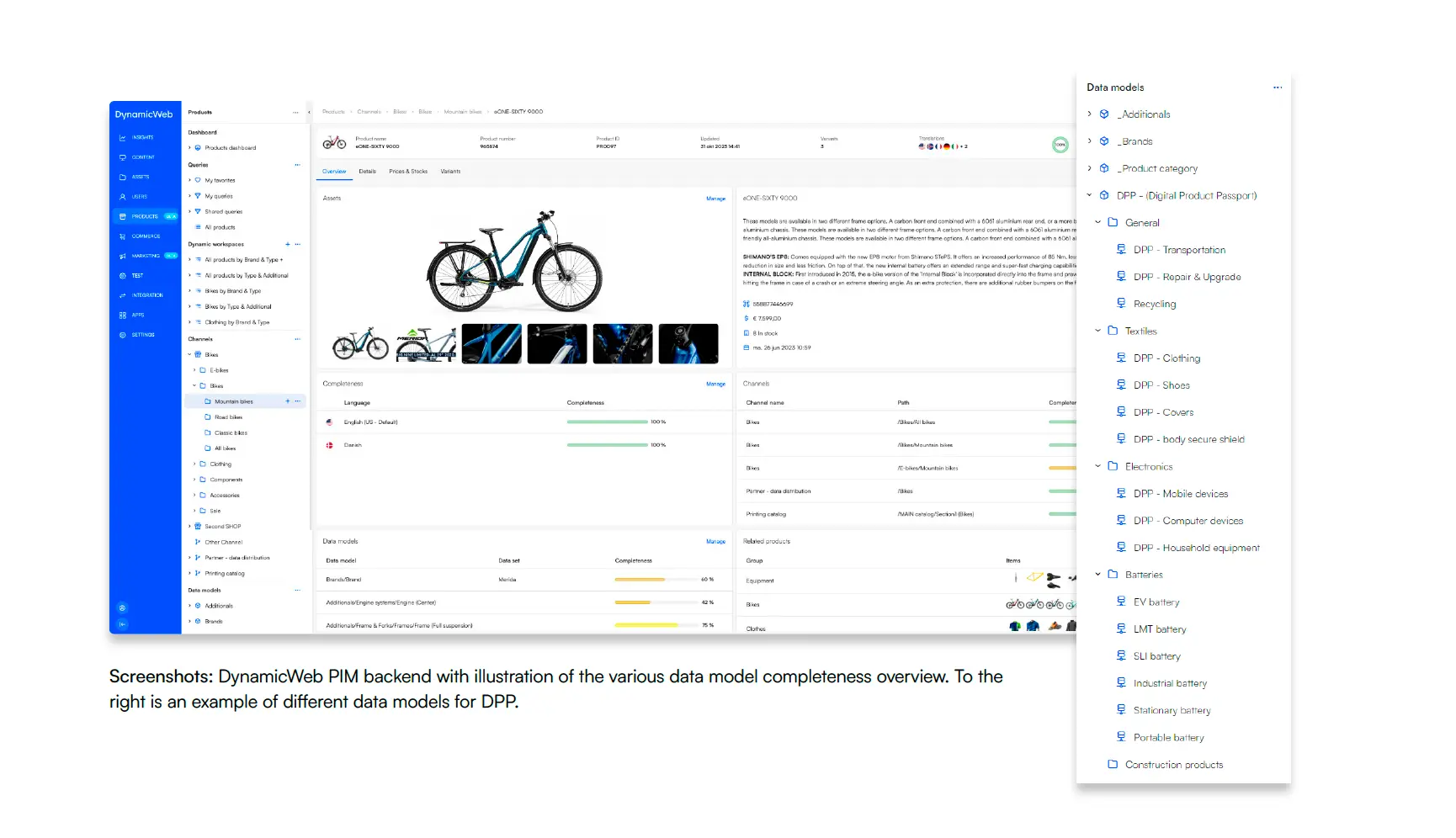The Digital Product Passport (DPP) serves as a powerful tool to achieve unparalleled transparency and efficiency in the supply chain, driving forward the principles of the circular economy. By providing detailed, accessible information about a product’s origin, materials, manufacturing processes, and lifecycle, DPPs empower businesses to make more informed, sustainable decisions. They enhance consumer trust and compliance with growing regulatory demands for environmental accountability, contributing to a more transparent supply chain. Digital Product Passports are becoming legally required in the EU to encourage sustainable practices and provide transparency about product authenticity and sustainability.
In this blog, we’ll explore the concept of DPP, how it benefits businesses, and how it integrates with other essential systems, particularly in supply chain management.
What Is a Digital Product Passport (DPP)?
A Digital Product Passport can be understood as a digital identity for products, designed to provide detailed information about the item’s lifecycle. Imagine it as a virtual passport that accompanies a product from its inception through production, distribution, and end-of-life disposal. All this information will be accessible to anyone who interacts with the product via a scannable tag, such as a QR code or similar technology. It will simplify the process for authorities to verify compliance with legal obligations.
Here are the key aspects of a DPP:
- Data Collection: A DPP collects and shares critical data related to a product’s sustainability, environmental impact, and recyclability attributes. This includes information about raw material sourcing, manufacturing processes, and more.
- Accessibility: Consumers, manufacturers, and other stakeholders can access a product’s DPP via digital means, such as scanning a QR code or using a digital interface. This transparency empowers informed decision-making.
- Sustainability Insights: By leveraging a DPP, businesses gain insights into their products’ environmental footprint. This data informs sustainability efforts, helps reduce waste, and supports circular economy initiatives.
The Digital Product Passport is currently in its early stages and will be implemented gradually. The first product category to feature this innovation will be batteries for industrial use and electric vehicles, serving as a test case. By 2026, it will be legally required for these batteries to include a Digital Product Passport. Subsequent categories will include textiles and electronics, with construction products to follow.
This new level of transparency will encourage brands and manufacturers operating within the European Union to source, produce, and distribute more sustainable products to stay competitive. This initiative will not only enhance consumer trust but also promote the benefits of supply chain transparency, such as improved environmental practices and social responsibility.
Data Standards for Manufacturers
The Digital Product Passport (DPP) will set new manufacturing standards for how manufacturers maintain the quality and consistency of their product data. As the EU finalizes the specifics, it is anticipated that the DPP will require manufacturers to include a range of data points to ensure supply chain transparency and traceability. This digital product passport regulation is a significant step towards enhancing sustainability in the manufacturing industry.
Some of the key data points expected to be included in the DPP are:
Product Data:
- Name, make, model, batch number
- Manufacturing date
- Warranty details
Materials Data:
- Origins of raw materials and components
Supplier Data:
- Information on the suppliers involved in sourcing
- Ownership Data:
- Details on current and past owners
Repair Data:
- Information about the overall repairability of the product
- Specific repair events and reasons
- Environmental Impact Data:
- Carbon footprint of the manufacturing and distribution processes
- Environmental impact throughout the product’s lifetime
Preparing for the Digital Product Passport
Getting your data in order is crucial for effective preparation. If you don’t already have a plan, developing one is essential, starting with an updated product data strategy. This strategy should outline how you will collect, organize, and handle data throughout its lifecycle.
When it comes to data management, a Product Information Management (PIM) system or a similar tool is a game-changer. These systems are specifically designed to streamline data collection, management, and sharing, ensuring that your product information is always accurate, up-to-date, and easily accessible.
Furthermore, establishing clear data collection and handling processes will help ensure that your data is consistent and reliable. This includes defining roles and responsibilities within your organization for managing and updating data and implementing quality control measures to verify its accuracy.
Why Use a Digital Product Passport in Your Business?
A Digital Product Passport (DPP) offers numerous benefits for businesses looking to enhance their operations and meet evolving regulatory requirements in the EU.
1. Transparency and Trust
- Consumer trust: Transparency builds trust. When consumers have access to detailed information about a product’s origin, materials, and environmental footprint, they are more likely to trust the brand.
- Compliance: The DPP aligns with regulations and standards, ensuring businesses meet legal requirements while demonstrating their commitment to sustainability.
2. Supply Chain Optimization
- Traceability: A DPP provides end-to-end traceability. Businesses can track a product’s journey, from raw materials to the finished item, ensuring accountability and quality control.
- Risk Reduction: By understanding every tier of the supply chain, companies can identify potential risks and address them proactively.
3. Marketing and Branding
- Storytelling: A DPP allows businesses to tell compelling stories about their products. Share details about ethical sourcing, eco-friendly practices, and positive social impact.
- Differentiation: Brands that embrace DPPs stand out in a crowded market. Consumers appreciate companies that prioritize sustainability.
Potential Challenges and Opportunities
The successful implementation of Digital Product Passports (DPPs) will rely on brands and manufacturers to collect, provide, and share the required data. The comprehensive data requirements of DPPs will undoubtedly pose challenges for many actors in the supply chain.
Challenges:
- Data Collection and Sharing: Companies will need to collect and share a vast amount of data, requiring a deep understanding of their products’ overall impact.
- Implementation of New Strategies: Companies will need to implement new strategies, processes, and systems to handle the data requirements, potentially necessitating significant investments.
Many companies are already progressing towards a more transparent and sustainable business model by setting new standards for their suppliers and enhancing governance. For these companies, the DPP will serve as a powerful tool to formalize and share their efforts.
Opportunities:
- Brand Positioning: The DPP offers businesses a new platform to position their brand as a serious and responsible partner with a sustainable business model, increasing consumer trust, brand image, and competitiveness.
- New Business Models: The DPP could open the door to new business opportunities, such as product-as-a-service activities, improved repair, servicing, remanufacturing, and recycling services.
While the implementation of DPPs will present challenges, it also offers significant opportunities for businesses to enhance their sustainability practices, improve their brand image, and explore new avenues for growth.
PIM and DPP: A Synergistic Partnership
A Product Information Management (PIM) system is crucial for companies aiming to comply with the new EU Digital Product Passport (DPP) requirements. It ensures that accurate and up-to-date data is always available, securely stored, and effectively distributed.
Integrating PIM with DPP streamlines the management of product data, creating a cohesive and efficient workflow. PIM acts as a single source of truth for all product information, ensuring consistency across all sales channels and simplifying data management.
DynamicWeb offers a flexible and scalable Product Information Management (PIM) system that enables companies to easily collect data from different sources, including ERP systems, third-party data pools, and partner feeds.
Here’s how a PIM system enhances the DPP process:
- Data Enrichment: PIM allows businesses to enrich existing product data with DPP-specific details. Materials, origin, and environmental footprint seamlessly integrate into the product record.
- Standardization: PIM ensures a consistent data format, making integration into future DPP platforms straightforward.
- Efficiency: PIM streamlines workflows, reducing manual data entry and ensuring consistency across sales channels.
- Scalability: As product ranges expand, PIM handles the surge in SKUs efficiently. Cloud-based PIM systems seamlessly scale to business needs.
- Integration with ERP and Third Parties: PIM systems like DynamicWeb’s can easily integrate with ERP systems, third-party data pools, and partner feeds. This integration centralizes data collection, ensuring that all relevant information is unified and accessible, further enhancing data management and operational efficiency.

ERP Integration with DPP
Enterprise Resource Planning (ERP) systems are crucial for managing business processes. Integrating ERP with the Digital Product Passport (DPP) can further enhance the efficiency and effectiveness of these processes.
Here’s how integrating ERP with DPP benefits your business:
- Seamless Data Flow: Utilize APIs to connect DPPs with your ERP system, such as SAP. This integration facilitates seamless data exchange, ensuring that information is always accurate and up-to-date.
- Scalability: A cloud-based ERP system can efficiently handle large volumes of SKUs and website traffic. This capability allows businesses to import millions of SKUs effortlessly, ensuring that the system grows with your needs.
- Holistic View: Integrating ERP with DPP provides a comprehensive view of product data. This includes financial information, supply chain details, and sustainability metrics, offering a complete picture of your business operations.
- Enhanced Efficiency: By integrating DPP with your ERP, you can efficiently collect primary data across the supply chain. This integration helps businesses understand the true impact of their operations and make data-driven decisions.
- Streamlined Operations: ERP-DPP integration centralizes data management, reducing manual data entry and minimizing errors. This streamlining of operations enhances overall business efficiency and effectiveness.
Why Dynamics 365 is the Optimal ERP Choice for DPP and PIM Integration
Dynamics 365 is the ideal choice for integrating with Digital Product Passports (DPP) and Product Information Management (PIM) systems due to its robust capabilities and seamless scalability. It offers comprehensive solutions that encompass financial management, supply chain operations, and sustainability metrics, providing a holistic view of business processes. The powerful APIs and cloud-based architecture of Dynamics 365 ensure smooth data flow and real-time updates, enhancing data accuracy and operational efficiency. Its flexibility and scalability make it adept at handling large volumes of SKUs and complex data, making it a reliable and efficient choice for businesses looking to streamline their operations and comply with DPP requirements.
Conclusion
Integrating Digital Product Passports (DPP), Product Information Management (PIM) systems, and Enterprise Resource Planning (ERP) can significantly benefit the UK market. This integration ensures that accurate and comprehensive product data is readily available, enhancing transparency in supply chains and compliance with regulatory standards. For UK businesses, this means improved traceability of products across the supply chain, aiding in sustainability in manufacturing and ethical sourcing efforts. The streamlined data management provided by PIM and ERP systems, such as Dynamics 365, allows for efficient operations and better decision-making. Additionally, the ability to manage large volumes of SKUs and detailed product information supports scalability and growth, giving UK companies a competitive edge in both domestic and international markets. This holistic approach not only boosts operational efficiency but also fosters consumer trust by providing detailed, reliable product information. As we move towards a more digital and sustainable world, embracing these technologies will be key to staying competitive and relevant in the market.
Unlock Efficiency and Transparency
Discover how integrating Digital Product Passports with your ERP system can optimize efficiency and enhance transparency.

